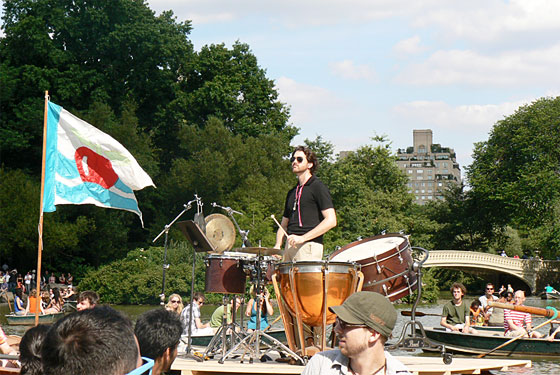
With exuberant overkill, the citywide festival Make Music New York welcomed summer with more than 1,000 concerts in a single eleven-hour day, including outdoor mini-recitals on painted pianos scattered around the boroughs and an ensemble of far too many accordionists in Brooklyn’s Washington Park. But surely no event balanced the avant-garde and the bucolic quite so deftly as the performance of Iannis Xenakis’s 1969 percussion sextet Persephassa, which took place on—literally on, not next to—Central Park Lake. Audience members in a flotilla of rowboats drifted around, quietly jostling for shade and waiting patiently while jerry-built rafts, each bearing an arsenal of drums, bells, gongs, and noisemakers, were piloted into position. Other drummers were arrayed on the shore, giving the placid boating party a slightly comical echo of Heart of Darkness.
The performers consulted with each other by cell phone and determined it was time to begin. Suddenly, rhythms ricocheted around the floating audience. The performers laid down a pulse and instantly undercut it; they diced beats into fine degrees of syncopation, and worked together as if they were close enough to see each other blink. Xenakis, the visionary Greek architect turned composer, intended Persephassa to surround and enclose its hearers, possibly to oppress them, even, if it came to that, to deafen them in a spasm of decibel overload. Most of that aggressiveness dissipated into the pleasant afternoon, though, and the phenomenal crashes turned into cowbell tinkles as they floated over the trees. The boaters, who may have expected some more cataclysmic finale, applauded politely, and rowed back to the dock. In that moment, Xenakis’s fearsomely brilliant music, declawed by the loveliness of a June afternoon, seemed suddenly natural and familiar, a part of the city’s soundtrack that had been hovering above the lake for decades, just waiting to be heard.
